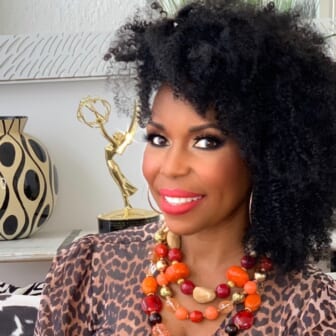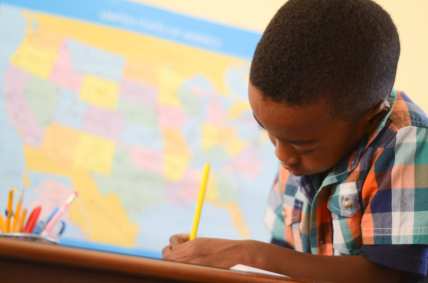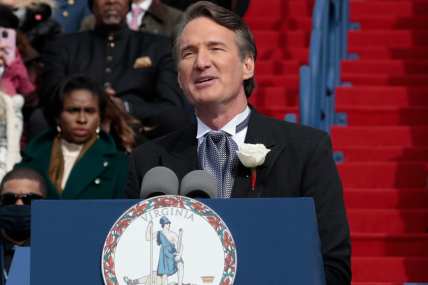The policing of Black genius
OPINION: My son was one of the countless gifted Black children labeled “bad” instead of “bright.” The policing of intelligent Black students derails the academic potential of our brightest future leaders.

My son C.J. told his first-grade teacher he wasn’t interested in anything she had to say. He refused to come to the carpet for math time because he said he had “learned all of that already.” He preferred to sit at his desk and write in his journal.
I had just gotten home from taping a cycle of Paternity Court in Atlanta. As a working mother, I carried so much guilt for having to leave my 6-year-old son at home for a week with his dad and a nanny. When I arrived at the classroom door for pick-up that day, the teacher made a point to tell me that C.J. had a “bad week.” She sent the details to me via email later that evening. I asked C.J. why he would speak to the teacher that way. He reiterated it was because he “learned all of that already.”
A few weeks later, at parent-teacher conferences, his teacher told his dad and me that she believed C.J. had behavioral problems. I was confused. Surely, the incidents she described in her email didn’t constitute labeling my son a behavioral problem. He was a straight-A student. I wondered if she had C.J. mixed up with another kid. He was the only Black child in the class, so that was unlikely. But how did our son go from a thriving kindergartener to a behavioral issue? This was supposedly a highly coveted 10 out of 10 charter school with a great reputation, but my son was falling through the cracks. Was he acting out because I had to leave every few weeks to go to work? He seemed to be functioning well in every other aspect of his life, and yet I still carried that sinking feeling of guilt.
Later that evening, I went to pick C.J. up from his afterschool science program, which was owned and operated by a Black woman. I asked her if she had any problems with C.J.’s behavior in her class. She said no. When I told her what his first-grade teacher said, she immediately mentioned that her son attended a school for highly gifted children, and she felt it might be a good fit for C.J. She explained that C.J., like her son, was highly advanced and understood complex scientific principles. An IQ test was a prerequisite to apply to this school, so we made an appointment with a psychologist.
After C.J.’s private session, the psychologist recommended C.J. apply to the school for highly gifted children. The only issue was he couldn’t apply until the spring of the following year. When I asked her advice on how to get C.J. through the school year, she said she would not advise us to take C.J. back to his current school. She explained that C.J. had exhibited every sign of a highly gifted child, but he was labeled a behavioral problem instead. C.J.’s reactions in his classroom were typical of many highly gifted students who are bored, but as a Black child, he wasn’t given the benefit of the doubt or the help he needed. At 6 years old, he was trying to express that he wasn’t engaged or challenged. If we sent him back there, we would run the risk of him feeling unsupported, being punished unnecessarily, and internalizing his teacher’s negative perceptions about his behavior.
Per the advice of the psychologist, I decided to pull C.J. out of school and homeschool him. It was a huge sacrifice for the entire family but necessary to protect my son. I hired a private teacher for the regular core subjects, and I taught him Black history and Bible study daily. C.J. thrived academically at home and was admitted into Mensa at age 6. I could see how much the lessons in Black history fueled his interest in his other subjects. The only problem was C.J. really missed the social aspects of school. When he was accepted to the school for highly gifted children the following year, we decided to let him attend.
My son was one of the countless gifted Black children labeled “bad” instead of “bright.” The policing of Black genius derails the academic potential of our brightest future leaders. NBC News examined racism in gifted education and found that almost 60 percent of children in gifted education programs are white. Black children made up only 9 percent of gifted programs and were the least likely to be identified in school. IQ tests have been found to be inherently racist, and many Black families lack the resources to pay for expensive psychologist visits to facilitate early identification and designation.
By the time most public schools offer gifted education programs, many Black students have already entered the school-to-prison pipeline because of the disproportionate discipline and punishment of children of color. I often think about what the outcome would have been for C.J. if we did not have the means to change gears so quickly. I think about all the parents whose children have been turned off and written off in an environment that should empower and build them up. I am sickened at the thought of how much Black genius sits behind bars.
Whether conscious or unconscious, racial biases lead to Black boys and girls being misjudged in the classroom. Their facial expressions and body language are misconceived. The tone of their voices and movements is deemed angry and aggressive. Their lack of engagement is misinterpreted as inferior intellect. Black children are more likely than their white counterparts to be labeled as behavioral risks and placed in special education programs. The cultural insensitivity and ignorance that rages through our country’s education system is an ever-present danger to our kids’ safety and healthy development.
An article published by Science News found that Black students were four times more likely to be suspended than white students, and racial biases “contribute to Black students being disciplined more harshly than white students.” Because of this, Black students are more likely to drop out of school and have contact with the law.
The systemic racism that plagues American school curriculums causes Black students to disconnect and disengage. Not seeing themselves reflected or the truth about their ancestors depicted in whitewashed school textbooks and curriculums amounts to a violent assault on their brilliant minds. The marginalization and criminalization of Black people are deeply woven into the fabric of the American education system. Black history did not start with the institution of slavery. Humankind and all language originated in Africa. The first universities were in ancient Africa. Greek scholars came to Kemet to learn from the Egyptians who learned from Ethiopians. Our ancestors were kings, queens, doctors, spiritual leaders, engineers and educators. While enslaved, our people were forced to use their intellectual gifts and skills to build this country for free and were forbidden by law to learn how to read and write. The policing of Black genius is nothing new, and American school curriculums still don’t teach the truth.
My son has spent far too much time challenging erroneous culturally offensive curricula and correcting teachers who negligently or purposefully offer racist fiction as fact. This erodes the trust that should exist between students and educators. There are, of course, good teachers who are doing their best to level the playing field, but school administrations are slow to implement the necessary changes to decolonize the current standard curriculum.
Continued opposition to critical race theory only reinforces the systemic racist practices that leave Black students battling constant micro and macro-aggressions in and out of the classroom. Every day that the truth is not taught, the lies prevail. These falsehoods are the very reason why so many Black children suffer through the educational process and leave feeling invisible and unfulfilled. We are responsible for advocating for our Black scholars who deserve an equal opportunity to excel. We must support them when they rebel against a system that was not built for them to succeed. We cannot afford to miss out on the limitless contributions their individual and collective genius will bring. In the words of Nina Simone, “There’s a million boys and girls who are young gifted and Black, and that’s a fact.”

Judge Lauren Lake is an attorney, author and Emmy Award-winning TV host of Judge Lauren Lake’s Paternity Court for six seasons and is now set to debut her latest courtroom program We The People with Byron Allen’s Entertainment Studios. Quick-witted and opinionated, Lake’s powerful persona resonates with her no-nonsense, tell-it-like-it-is approach to laying down the law.
Originally from Detroit, Michigan, Lake graduated from the University of Michigan and earned her law degree at Wayne State University Law School. Lake is passionate about advocating for women, children, families and underserved communities.


